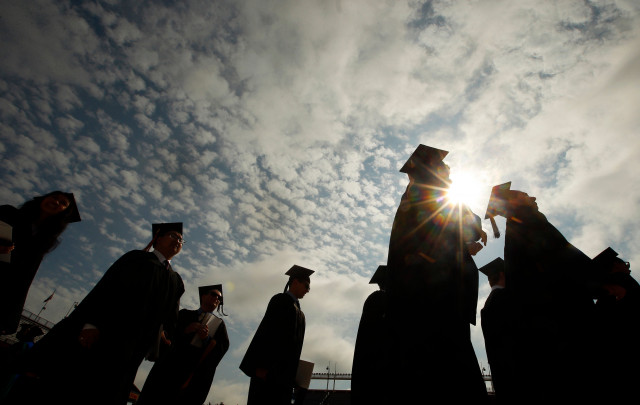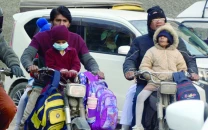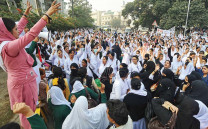Academic crisis: On the back burner for 10 years
Despite imposition of an emergency, the Sindh government failed to improve the standard of education in the province

A Reuters file photo of graduating students.

As the world bids adieu to a decade of academic advancements, Sindh will usher in 2020 with very little to celebrate and perhaps too much to mourn. Almost ten years of bone-headed decisions and policies have left the provincial education in a state of despair. Neither the quality of education could be improved nor the overall educational environment in schools. The education boards, the Sindh Higher Education Commission and other educational institutions are facing the worst crisis at an administrative discretionary level.
Although major administrative decisions were taken in the sector throughout the decade and their implementation was also ensured, the measures taken by the government failed to bring about considerable changes amid a lack of planning and vision.
In 2013, the Sindh government introduced the "free and compulsory education" law under Article 25-A of the Constitution. Yet, this major step has not made any significant impact on compulsory education in the past seven years.
Concerning free education, the enrollment and examinations fee for 9th grade to 12th grade students studying at public institutes has been abolished. Students do not have to pay admission and tuition fee when applying to government colleges either. It is worth noting that public school students have not been charged tuition fee for many years; however, after abolishing the fee for matriculation and intermediate enrollment and exam fee, educational boards in Sindh are facing severe financial constraints.
To address the issue, the Sindh government decided to provide funding to the Sindh Board of Education in place of the enrollment and examination fee. In the last two years, however, the government has not been able to pay the promised amount to the board.
Alarming levels of discrimination in Pakistan's education institutions: report
Universal education
On the other hand, measures taken by the Sindh government have been superficial in regards to the second part of the legislation: the provision of compulsory education to children. Sadly, the Pakistan Education Statistics report 2016-17 shows that more than six million children of school-going age are still out of school, while the drop-out ratio of students in public schools after secondary school, particularly after completing the eighth grade, is still prevalent in the province. During a briefing session with Sindh Chief Minister Syed Murad Ali Shah in 2018, the Sindh Education Department Sindh confessed that 56% of children in the province, aged five to 16, are still out of school.
The provincial education department argues that since several primary and secondary schools are established far away from the residences of students living in remote and rural areas of Sindh, they find it difficult to go to school in the absence of transportation facilities. To sort out the problem, the government planned to set up campus schools but the plan could not see the light of day either.
Education system failing due to lack of practical education
Imposing emergency
It may be recalled that after the imposition of the educational emergency in Sindh, the Department of School Education was split into two units: the Department School Education and the Department College Education with separate secretaries heading both the departments.
As a result, a significant step was taken by the Department of School Education according to which a biometric system was introduced for the attendance of teachers in public schools. As a result, considerable improvement in terms of teachers' presence was witnessed. Whether teachers actually conducted classes or only went to school for the sake of marking their attendance is still not known.
Apart from the substandard quality of education, the presence of basic utilities in public schools is still bleak despite the educational emergency in place. According to the Reform Support Unit's report last year, 39% of the public schools in Sindh are still without basic shelter, 55% lack toilets, 55% lack electricity, while 43% of schools do not have access to clean drinking water.
Following the approval of the Eighteenth Amendment, in January 2011, the Sindh Assembly approved the transfer of the administrative control of education boards from the governor to the chief minister. The decision was taken during the tenure of the former governor of Sindh, Ishrat-ul-Ebad Khan, and former chief minister Syed Qaim Ali Shah.
After the approval of the law in 2012, all powers in relation to the appointment of the chairman, secretary and controller of examinations were handed over the chief minister. However, even after seven years, no permanent secretaries or permanent controller of examinations have been appointed in any of the educational boards across the province.
The tenure of the chairpersons of most academic boards in Sindh were been completed almost three months ago but they are still holding the positions because no notification regarding further steps has been issued by the government yet.
It is pertinent to mention that the Sindh government set up the Department of Universities and Boards to control the educational boards and government universities but it still miserably failed to fix the ad-hoc system.
Such is the case with several other government universities, including the University of Karachi which is the largest higher education institute in the province as its vice-chancellors are still working intermittently.
Even though ads for the vacant positions were placed in the newspapers and several suitable candidates had sent in their curriculum vitae too, no further action was taken by the authorities.
Meanwhile, although universities are functioning without permanent vice-chancellors, the government of Sindh at least managed to appoint permanent finance directors for 17 government universities in the province - that too after several years.


















COMMENTS
Comments are moderated and generally will be posted if they are on-topic and not abusive.
For more information, please see our Comments FAQ